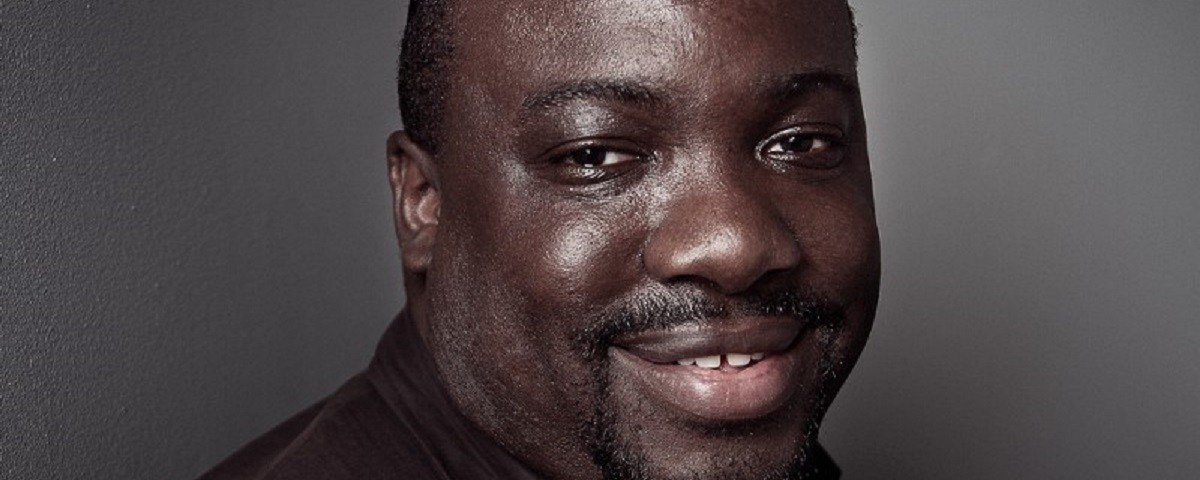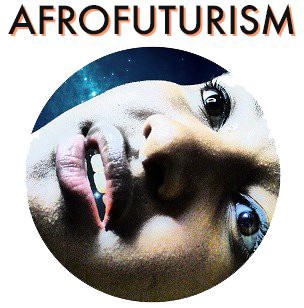
As part of our Afrofuturism coverage, we’re featuring interviews with makers, artists, and thinkers from around the world. Afrofuturism is not just an aesthetic–it’s just as much a framework for activism and imagining new technologies. We’re interested in how the movement can make a practical difference in the lives of those from whom the thought culture draws.

In this part of our Afrofuturism collection, we’re moving beyond today and thinking about the future. Our first guest is Manchester-based Ian Forrester, a UX and maker advocate who works with the BBC. A regular on the tech scene, he can usually be found giving talks around town and microblogging. We took some time to chat with him about black culture and technology, and the future of adaptive media.

Florence Okoye: Could you start by telling us something about your background?
Ian Forrester: Well, I’m a black English gentleman from Bristol (down south if you talk to most northerners in the United Kingdom). If you are after my background, my parents are Jamaican but moved here in their late teens.
What do I do is a very difficult question. I get this all the time when speed dating and try different answers each time.
I do lots of things, including work at BBC Research & Development in the UX (user experience) section. I’m a blogger since 2003, DJ, geek, and responsible for a string of social events in Manchester and London. I’m driven by progress and making things better for myself, my family, friends, and humankind. Not in some lofty way but by conversation and good uses of technology.
FO: How did you realize this is what you wanted to do? It can be tough having multiple interests and figuring out exactly what you want to do with them.
IA: I kind of knew I was different from other people at an early age. Yes, there was the challenge of being one of three black people in a junior school, but I also found out I might be dyslexic. Friends could tell you I didn’t quite fit in–though I wasn’t a misfit. I was popular, kind of sporty, but also geeky and fiercely independent in thought. This meant I tended to find my own way of doing things, and therefore my independence was tied to use of technology. It was only later at university that I learned once and for all that I was dyslexic, and my coping strategies existed around technology.
I guess that’s a long way of saying that I find good use of technology can make all the difference. So I seek out those good uses which make the difference in people’s lives, make them realize who they really can be.
FO: Have you always been interested in working in tech?
IA: I don’t really think of myself as working in tech. I studied as a designer; originally I wanted to be an architect but decided it was going to take too long getting through college and university. Alongside my graphic design course, I was learning about computer hardware and building [computers] for myself and friends. This is also when I learned about hacking and digital rights.
There was a key moment I will never forget when learning about the web and creating HTML pages. I did one of my design projects as a website and my college lecturer asked me to print it out. I tried to explain and pled with her that this was a different medium and printing it out made no sense. I think it was that moment when I started to side more with the tech.
That and I really got into information design, and I thought XML (metadata about data) was the best thing I had ever heard of and used. From that moment, I was being classed as a programmer, not a designer, though I do think I have a designer’s approach.
FO: Were you interested in science fiction?
IA: I hate popular culture. It winds me up [to] no end! I was a geek but never got into fantasy or really into science fiction. I found it too stereotypical and formulaic for me to take seriously.
I also was massively influenced by dance/rave music, which was a very different culture. I remember hating mainstream radio for not playing rave music. The mainstream press was vilifying ravers and this new culture.
They say house music is a feeling, but it’s a whole culture which didn’t get its dues till far later, and even now it’s been watered down and packaged up into something boring and generic. This goes against my core principles.

FO: It’s become quite fashionable to talk about getting young people, especially black and “ethnic minority” youth, into tech. What are the best ways of doing that?
IA: I think it’s important to get people interested in technology, and creative uses of technology are the key–be it music, video, etc. I’m always reminded of the start of Acid house. A few guys pushing buttons on a TB-303. Nothing that interesting, but they brought their own creativity to it and before long you had a whole new genre of music. Another example is remix culture. The technology enables people to mash things together by building on top of previous work. Technology should be enabling and be creative.
FO: That’s something Kodwo Eshun touches on in his writing about Afrofuturism and sonic fiction–this idea that people use music to create new worlds, but especially music created using these quite futuristic methods. When did you first hear about Afrofuturism?
IA: I first heard about Afrofuturism via people in Manchester. It instantly got me thinking about alternative futures, like how the darknet is an alternative approach to use the internet. Some of the technologies are ignored, hated, or even banned by the incumbent establishment.
For me, Afrofuturism is about black culture applied to technology. It’s similar to the way blues and jazz were rejected by the establishment way back when. You can see in the way mainstream media discuss the darkweb. This is a continuous cycle and Afrofuturism is the overall trend.
Making it a reality is about keeping your senses open to alternative approaches, which are more emergent from black culture.
FO: How relevant to do you think Afrofuturism is to us as black British people today?
IA: I think it can be useful as a way to unite the black community, particularly in the way it’s focused on the future.
FO: In the United Kingdom, there’s a lot more emphasis on STEAM, putting the arts (the A) back into STEM. How could universities and other organizations help foster a more intersectional, diverse approach to tech?
IA: STEM does worry me a little, and STEAM does address some of the concerns. I haven’t seen many initiatives focused on how art fits into the picture. The one getting the most attention is STEM, meaning it pushes out STEAM. Because of this, I’ve heard of very few which I can point directly out but the Mozilla Foundation is doing a lot, which is great. Of course the BBC is doing a lot, too. I especially love the visualization tool Vizii, which was thought [up] and built by some great women in the BBC. It blends all the STEAM disciplines together perfectly. On a similar tip, Ikem from Moss Code is taking music and remix culture into coding. This is the type of thing which engages people and is magical to think about.
FO: Over the course of this month, we’ve been looking at the people on the ground making tech in slums and their bedrooms. You’ve done a lot of research into human-centered technologies (e.g., making cinematic/televisual experiences filtered by personality, analyzing the ethics/safety of the digital self, etc.). Do you see these things as connected?
IA: I see everything as connected. It’s just the way my mind thinks, being dyslexic. I see technologies which are not ready for the mainstream, technologies which break rules and change the centralized power structures. They are ignored or rejected till they get too big and the incumbents have to face up to them or outlaw them, as it breaks their fragile business models.
This is classic innovator’s dilemma stuff, to be honest.
FO: Ha, yes, I can see that. As an innovator yourself then, how do you think the DIY tech/hacker culture will impact future mainstream technologies? Or do you think it could get rid of the very concept of mainstream technology?
IA: This is classic Cluetrain Manifesto stuff. I still recommend that book to anybody and everybody thinking about the future of technology.
You have many network effects: niches coming together for common and neutral benefit; collaboration at the edges rather than the mainstream. One such example is BitTorrent, which came from the hacker scene. It’s challenged Hollywood and so many of the other media incumbents.
The concept of mainstream is breaking down. I like to think so [at least], but at the center of it. Partly because it’s so efficient, free, and open.
FO: OK, so one last question. Of all the tech you’re into, what do you think is the most exciting, and how do you see it evolving in the next decade or so?
IA: There are lots of interesting trends in store for the future. I don’t like to dream about [them]; instead, I follow the Alan Kay quote, “the best way to predict the future is to invent it.” Instead of inventing it, which makes people imagine people in basements doing funny things alone, I would change the last part to collaborate.
The reality of contextual/adaptive/perceptive media–there is still not one word which sums it up and everybody can agree on–is my big bet for the next 50 years. Narrative has always been core to humans, but now we have the technology to tell stories in a more humanistic way.
There is a great TED talk by Chimamanda Adichie, which sums up the problem with “the single story.” The single story is what we will look back at in 50-years’ time and just be shocked. It’s not just the story content but so many other factors such as language, time, location, context, etc.
It can play out in many different ways–be it a book, audio, video, virtual reality, augmented reality, or mixed reality. It could play out within Internet of Things, connected spaces, biologically, or even neurologically. The scope is increasing every day and it doesn’t make sense to play a 48-minute drama out over a connected space like a smart city.
In the next 10 years, the idea of a single narrative will be challenged. There will be a newness about contextual/adaptive/perceptive media. I expect it will still be on the very edges, but people find it refreshing and quite like the experiences they have.
In 20 years, there will be a backlash from the established incumbents who have gotten too comfortable with the old notions of broadcasting and publishing. It’s understandable, as talked about in the innovator’s dilemma previously. There will be those harping back to “better times.”
In 50 years, all media will be contextual/adaptive/perceptive. We will look back at the days when media ran to a time–and we had to skip forward and backwards–in the same way we frown upon games which restrict your actions down to a single action at a certain time. Some people will enjoy it, but most won’t even bother calling it a game.
If you’d like to find out more about Ian’s work and his many amazing projects, follow him on Twitter @cubicgarden.

How We Get To Next was a magazine that explored the future of science, technology, and culture from 2014 to 2019. This article is part of our collection of conversations about Afrofuturism, curated and edited by Florence Okoye of Afrofutures UK. Click the logo to read more.

